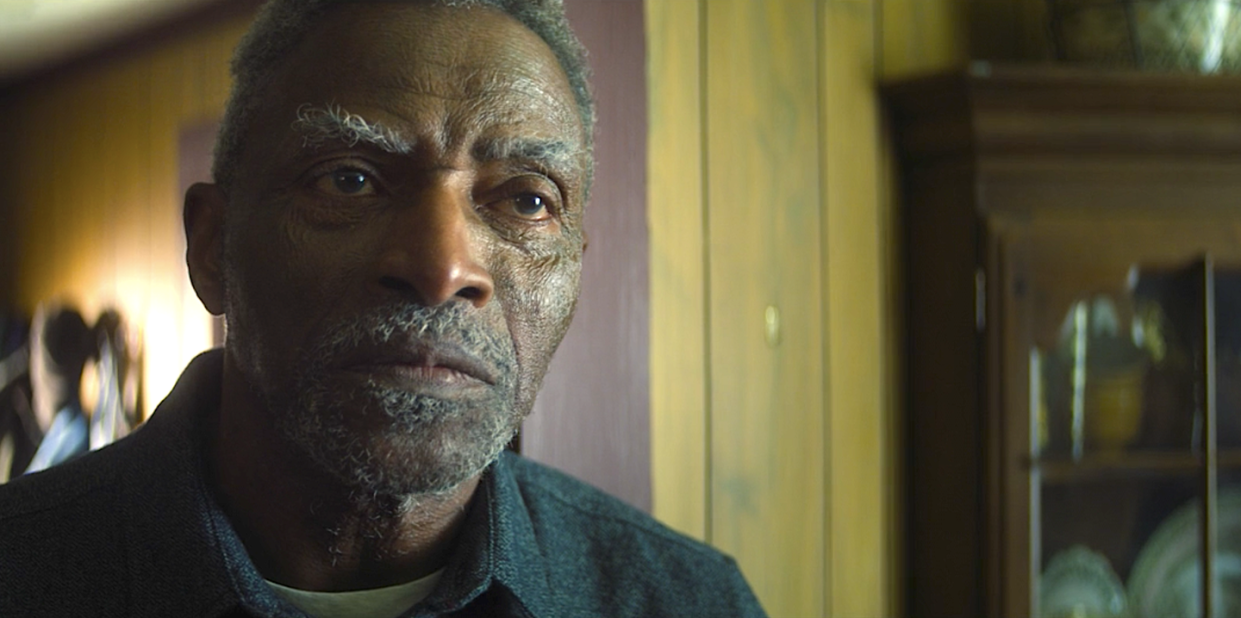Isaiah Bradley's Appearance In 'The Falcon and The Winter Soldier' Visits a Dark Chapter in MCU History

If you look hard enough, nearly all of the stories in the Marvel Cinematic universe aren't just about light shooting out of people's hands. The not-talked-about-enough Iron Man 3 told a harrowing story of what it's like to live with PTSD. Captain America: Civil War showed what remains after a worldwide tragedy. WandaVision, of course, grappled with grief.
The Falcon and the Winter Solider, which just debuted its second episode on Disney+ this Friday, isn't any different. First of all, this show might just tackle QAnon, far-right conspiracy theorists, and how America treats its veterans. Now, with Baltimore cops racially profiling Sam Wilson and the introduction of a once-jailed Black Captain America, The Falcon and the Winter Solider is looking at the mistreatment of Black people in this country. And with the latter moment—Isaiah Bradley's entrance into the MCU—the lens won't just be fixed in the present day.
Near the end of Episode Two, Bucky tells Sam, without any context, that he has to meet a guy named Isaiah. The never-not-bickering duo takes a day trip to Baltimore, where they walk to Isaiah's house. After convincing Isaiah's grandson, Eli, to let them in, Sam and Bucky come face-to-face with Isaiah. Turns out Bucky, back in his evil HYDRA days, squared off against Isaiah... who we come to find out is a super-soldier, still capable of throwing a dude through a wall. You'd think that having Captain America's same exact powers and kicking HYDRA's ass would set up Bradley for life, right? Wrong. "They put my ass in jail for 30 years. People running tests, taking my blood, coming into my cell," Isaiah says. He kicks Sam and Bucky out of his house.
As always, the comic books have the full story. It's a tough one to stomach. During World War II, the U.S. Government wanted to create more Captain America-type heroes using the super soldier serum. But they needed to run some experiments first. The government forces 300 African-American soldiers to participate in the trials, which turned lethal. Nearly all of the men died; the government sent letters informing the families that they died, withholding the project's true intent. Isaiah Bradley somehow survived—and with his new powers, he took up the mantle of Captain America and led several successful missions in Europe. When he returned home, though, the judicial system sentenced him to life in prison for stealing Captain America's shield.
After JFK's inauguration, Isaiah was pardoned and sworn to secrecy. But the damage had already been done, with Isaiah's mind deteriorating due to side effects from the serum. The story is based on the real-life Tuskegee Study, a 40-year-long, Public Health Service-conducted study which began with 600 Black men, most of whom tested positive for syphilis. Over the course of the study, researchers told the men they were being tested for "bad blood" and deliberately withheld information they needed to give proper consent. The participants were never given an option to quit the study, either, nor offered proper syphilis treatment when it emerged.
With Isaiah's story, The Falcon and the Winter Solider gives a painful reminder of how America treats its Black heroes—past and present. You have a bank denying Sam Wilson a loan after he saved the damn world. And now, in Isaiah Bradley, a story reminiscent of his real-life peers from his era, in the civil rights leaders who were either silenced, jailed, or killed for fighting for equal rights in this country. That's not even including the parallels to the Tuskegee Syphilis Study, which is part of a much larger history of racism and discrimination in American healthcare. And with those Baltimore cops profiling Wilson in the episode, too? We're only at the beginning of the show's look at the state of racial politics in America.

Join Esquire Select
You Might Also Like


